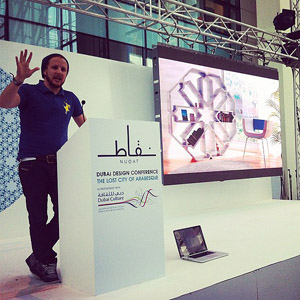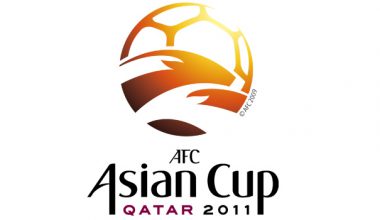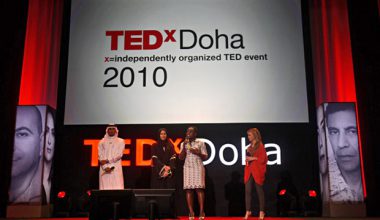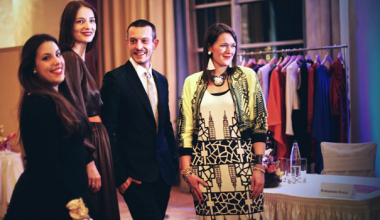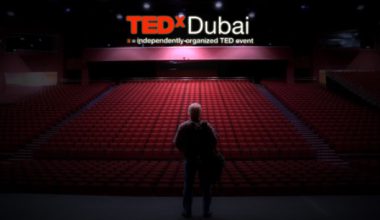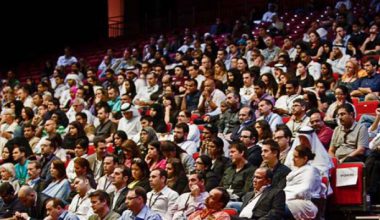
The third and last day of Nuqat lectures involved speeches that were insightful, personal and raw. The speakers talked about their heritage and culture and how it shaped their own mindset, vision and is now echoed in their work.
The Passion of Simplicity by Nedda El Asmar (Designer, Silversmith and Educator)
Nedda El Asmar, is an international award-winning, renowned designer and her lecture revolved around how she draws inspiration for her work from Islamic art and culture. The products she makes are focused on being simple yet functional. She believes in designing pieces that are trendy, unique and pure.
As she took the audience on her journey through her college years and work life, she showcased slides of her sophisticated designs and gave an insight into its concept and development.
She has produced work in pure silver, sterling silver and pewter. Her initial work consisted of teapots, cups, spoons and other cutlery. Each of the items she has made is a modern interpretation of the classic designs seen over the centuries in the Arab world.
Some of the more unique pieces by her, include a horse saddle without any stitches, a shisha made from high-tech ceramics and trophies that are in the form of cups that can be used for drinking.
Working for world-class design houses including Hermes, Royal Boch, Villeroy and Boch, El Asmar always remains true to her signature style of contemporary versions of classic designs. Her lecture concluded with an emphasis to design clean, multifunctional objects that would have a universal appeal.
The Journey of the Reversed Migration by Alanoud Al Sabah (Jewelry Designer)
Alanoud Al Sabah began her talk with an introduction to her internationally recognized jewelry brand Octium that was born by her own love for jewelry. Trained as an architect, she would sketch jewelry designs for her own personal collection.
Octium has been developed as a brand that takes inspiration from the Arab craftsmanship while complying with strict global standards of quality.
Al Sabah explained how she believes strongly in encouraging and supporting local artisans so that the dying industry can be revived. Proud of her heritage, her designs echo typical Arab style that has been modernized to suit present times and tastes.
The latest collection set to launch this year is inspired by the Andalusian civilization that combines the East and West.
Al Sabah emphasized on the need to be self assured and confident in our art, culture and taste as a region in order to move forward and be recognized and appreciated by the West.
Darmaki and the Arab Fashion Movement by Sultan Darmaki (Luxury Footwear Designer)
Sultan Darmaki’s creative shoe designs are being hailed as innovative and fashion forward by leading fashion experts around the world. Acknowledging his newfound success, Darkmaki’s lecture was about focusing his energy on trying to create an internationally recognized Arab fashion movement.
He spoke about his determination to develop, support and train young aspiring Arab designers. He believes strongly in the talent in the region and is committed towards mentoring them into becoming global fashion leaders.
As a designer he empathizes with the struggle of upcoming artists and wants to involve the government and the media to support his fashion incubator plans. He spoke enthusiastically about his vision of Arabia becoming a region where there will be more fashion departments, awards and forums for information sharing.
His lecture concluded with his strong belief in the Arab talent and the eventual international recognition of it.
Lost and Found, Making Islamic Art Cool by Rana Salam (Graphic Designer)
Rana Salam took to the stage and spoke about her work over the years. A free spirited woman, she emphasized on the fact that all her inspiration comes from shapes and patterns of Islamic Art that she develops further into forms and ideas for her work.
Her lecture revolved around making the audience understand that traditional can be made into contemporary and intricate designs can be molded into modern styles and with that mix, old designs can be made to look fun, playful and cool.
She spoke about the culture of the Middle East serving as a source of inspiration to designers in the West and how it is about time local designers draw inspiration from their own heritage.
Salam urged the audience to challenge themselves and celebrate their local heritage by showcasing it in their design; to draw inspiration from within their culture rather than shy away from it.

Chroub o Choof (Drink and Look) by Younes Duret (Product Designer)
Younes Duret, young and enthusiastic, began by explaining his journey into the design industry. Owner of a globally famous design house, Duret moved to his native Marrakech to start his company. Inspired by the sights, sounds and general life and chaos of the medina, Duret has always created pieces that are innovative in design but functional in use.
His best works, including the award-winning Zelli bookshelf, have been inspired by Middle Eastern motifs and design. Each of his designs echoes the Arabesque theme that has been modernized and updated. He believes strongly in using new science and technology that is eco-friendly but at the same time distinctly Arabesque in its look.
As someone who is extremely proud of his background, he explained that he has worked extensively with local craftsmen, learning and drawing inspiration from their work, knowledge and experience.
He urged the audience to work as a community, to reach out to the artisans in the region, to find themselves and their identity, and design for the future.

Designing for Tomorrow by Nadine Chahine (Type Designer)
Nadine Chahine focused her on her search for harmony between Arabic and Latin scripts. An award-winning type designer she is determined to eradicate the clichés of Arabia in the minds of the Western world. Chahine wants to draw attention towards the positives of the land, on the beauty of architecture, letters and type design.
Her philosophy is echoed in her work where she has created different Arabic typefaces including Futiger Arabic, Neue Helvetica Arabic and Palatino Arabic. The idea is for the two texts to sit together, side by side and co-exist in harmony is symbolic to her struggle to find peace and order in the world around her.
Her talk focused upon wanting equality and balance between the two texts without losing either of the identities or merging the two. Her work is technical and she focused upon the struggle to find order between the two texts.
Chahine ended her note by emphasizing that all artists in the region should design for a better tomorrow.

Replacing Lost Pixels by Haleh Anvari (Photographer)
Iranian writer and photographer Haleh Anvari began her lecture with a moving video that captured her audience. In it, she explained how her own identity has been affected by political and religious waves of change in Iran as she grew up. She gave us insight on how life really was in her home, despite the political misrepresentations found in the media. She is inspired by cultural nuances, particularly the Iranian chador (or local hijab), which she felt became an abused and unfairly represented symbol of Iran.
In order to create an artistic dialogue in Iran, as well as to document what life was truly like behind the newspaper headlines and television representations, she launched www.aksbazi.com. Through this website, citizens were invited to share photographs with her, and each other, according to assigned themes. This digital realm gave people an opportunity to share with the world the true image of their nation, and to document what their personal lives were like. One of the examples of a theme that was given on the site was ‘Beautiful Persian Noses’, where participants were invited to take photographs of a typical Iranian nose that had not gone under the knife, as so many had.
As Haleh documents life and culture in her country, aiming to represent her nation through the eyes of its own people as well as eliminate clichés, she urges the people of the Gulf to do the same. She hopes to expand Aks Bazi to the GCC, where local citizens can share their own views and cultures with the rest of the world.
– Saira Malik and Rahab Al Majed
Images courtesy of Nuqat Instagram

